

Commentary Select
Commentary Select




Pillar New Testament Commentary (PNTC): The Letter to the Ephesians
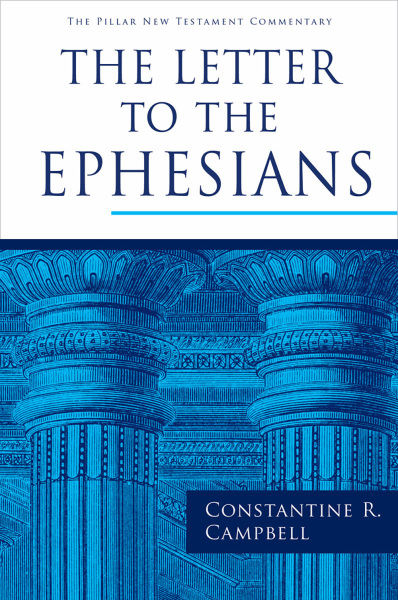
Pillar New Testament Commentary (PNTC): The Letter to the Ephesians
A clear and comprehensive commentary on Paul’s Letter to the Ephesians.
In the latest Pillar New Testament Commentary, Constantine R. Campbell illuminates the Letter to the Ephesians with scholarly precision and pastoral warmth. In line with the christological concerns of the letter, Campbell calls special attention to its theme of union with Christ. His thorough analysis covers a breadth of topics, including salvation and grace, the glory of God, and the church and its mission.
Aimed at students and scholars of the Pauline epistles, Campbell’s commentary carefully explains each verse of Ephesians with attention to historical and linguistic context. Yet the commentary prioritizes imminent theological concerns and remains accessible to any serious reader of the New Testament.
Designed for serious readers of the Bible, The Pillar New Testament Commentary seeks above all to make clear the meaning of the text of Scripture as we have it. Writers of the PNTC volumes interact with the most important, informed contemporary debate yet avoid undue technical detail. Their ideal is a blend of rigorous exegesis and exposition, scholarship and pastoral sensitivity, with an eye alert both to biblical theology and to the contemporary relevance of the Bible.
Constantine R. Campbell is associate research director at the Sydney College of Divinity. He is ordained deacon in the Anglican Church of Australia. His numerous books include Paul and Union with Christ and Paul and the Hope of Glory.
Pillar New Testament Commentary (PNTC): The Letter to the Philippians

Pillar New Testament Commentary (PNTC): The Letter to the Philippians
After a select bibliography, Hansen's introduction sets forth the historical setting of the church in Philippi, the nature and occasion of the letter, and a preview of two key themes—the gospel of Christ and the community in Christ. The commentary itself discusses Philippians in light of these themes, considering Paul's greetings, reports of gospel ministry, imperatives for citizens worthy of the gospel, recommendations of two Christ-like servants, and disclosures of his personal experience. Hansen's treatment as a whole is distinctive for the way it draws out and highlights the themes of partnership, citizenship, and friendship in Paul's Philippian letter.
"With themes and emotions so varied, the letter to the Philippians needs a commentator with a sure grasp and a warm heart. . . . Hansen writes with admirable clarity and simplicity, even when he is unpacking notoriously complex matters."
— D. A. Carson (from the preface)
Pillar New Testament Commentary (PNTC): The Letters of 2 Peter and Jude

Pillar New Testament Commentary (PNTC): The Letters of 2 Peter and Jude
Pillar New Testament Commentary (PNTC): The Letters of John, 2nd Ed.

Pillar New Testament Commentary (PNTC): The Letters of John, 2nd Ed.
This updated and revised Pillar commentary seeks to clearly explain the meaning of the letters of John to teachers, pastors, and general readers looking for a reliable and trusted resource for personal study. Colin Kruse introduces the important issues involved in interpreting the Johannine letters, gives verse-by-verse comments, and provides extensive discussion of major theological themes, including the real humanity of Christ, atonement, the role of the Spirit, Christian assurance, koinōnia, Christian love, and eternal life.
The Pillar New Testament Commentary, designed for serious readers of the Bible, seeks above all to make clear the meaning of the text of Scripture as we have it. Writers of the PNTC volumes interact with the most important, informed contemporary debate yet avoid undue technical detail. Their ideal is a blend of rigorous exegesis and exposition, scholarship and pastoral sensitivity, with an eye alert both to biblical theology and to the contemporary relevance of the Bible.
Reviews
“Serious students of the Johannine literature will find in this book a reliable and trustworthy guide to John’s letters. Kruse brilliantly reconstructs the context of the struggles that John’s church faced, and he successfully expounds the apostle’s defense of orthodox belief in what must have been a tumultuous and difficult era. Many generations will find themselves in Kruse’s debt for his outstanding contribution.” — Gary M. Burge, Calvin Theological Seminary
“A splendid achievement and a welcome addition to the excellent Pillar series. The numerous notes on Johannine themes and the helpful attention to the relevant patristic sources are notable features. Comprehensive, thorough, and judicious, Kruse’s work promises to be a standard for many years.” — Paul Barnett, former bishop of North Sydney, Australia
Colin G. Kruse is senior lecturer in New Testament at Melbourne School of Theology, Australia. His other books include the Pillar New Testament Commentary on Romans and Tyndale New Testament Commentary volumes on John and 2 Corinthians.
Pillar New Testament Commentary (PNTC): The Letters to the Colossians and to Philemon, 2nd Edition

Pillar New Testament Commentary (PNTC): The Letters to the Colossians and to Philemon, 2nd Edition
An erudite and evangelical guide to Paul’s letters to the Colossians and to Philemon.
With brilliant exegesis and sound practical insight, noted commentator Douglas J. Moo explicates the Letters to the Colossians and to Philemon, with an eye toward their application for readers today. Moo bases his commentary on the Greek text of the letters, while accessibly explaining the English text to his contemporary audience.
Freshly revised and updated, this second edition remains methodologically sound, authentically evangelical, and pastoral in approach. This invaluable volume of the Pillar New Testament Commentary series offers biblical insights to a wide range of readers, from teachers and students to pastors and parishioners.
Praise
"In his updated and revised Colossians and Philemon, Doug Moo has provided an ongoing gift to the church. With his typical clarity and cogency, he ably navigates the many historical questions of both letters. His judicious exegesis and theological reflections offer readers nuanced discussions of these letters in their original contexts, with thoughtful contextualization for the church today." — Jeannine Brown, David Price Professor of Biblical and Theological Foundations, Bethel Seminary
Douglas J. Moo is professor emeritus of biblical studies at Wheaton College. His other commentaries include the New International Commentary on the New Testament volume on Romans and the Pillar New Testament Commentary volume on James.
Pillar New Testament Commentary (PNTC): The Letters to the Thessalonians
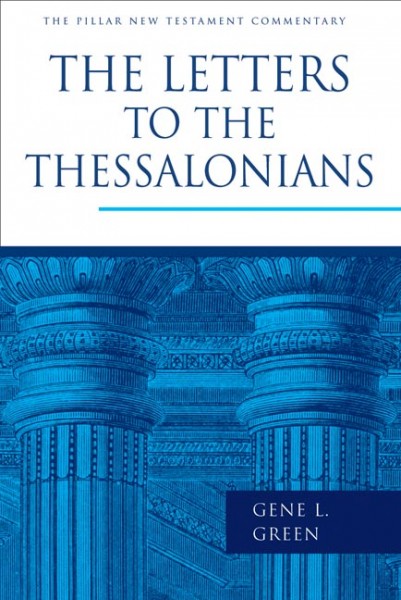
Pillar New Testament Commentary (PNTC): The Letters to the Thessalonians
The book begins with an in-depth study of the Thessalonians themselves — their history, land, socioeconomic conditions, and religious environment. This fascinating discussion gives the necessary context for fully appreciating the circumstances surrounding the founding of the city's first church and the subsequent struggles of the Thessalonian believers to live out their Christian faith.
The main body of the book provides informed verse-by-verse commentary on 1 & 2 Thessalonians that extracts the fullest possible meaning from these important New Testament texts. As Green's exposition shows, the Thessalonian scriptures are especially valuable as letters of friendship and for showing Paul's pastoral concern for the many areas in which the Thessalonians needed guidance. Some of Paul's purposes are to thank the new believers for their steadfastness amid suffering, to encourage them in their trials, to urge them not to neglect their daily work, and, no less important, to teach them about the future of believers who die before Christ returns. Indeed, the matter of the last things and the second coming of Christ so permeates these texts that they are often called Paul's eschatological letters.
Filled with new information about ancient society, this commentary will fast become a standard reference work for Bible study. By carefully bridging the biblical and modern worlds, Green shows with clarity and warmth the continuing relevance of 1 & 2 Thessalonians for contemporary readers.
Pillar New Testament Commentary (PNTC): The Letters to Timothy and Titus (Yarbrough)
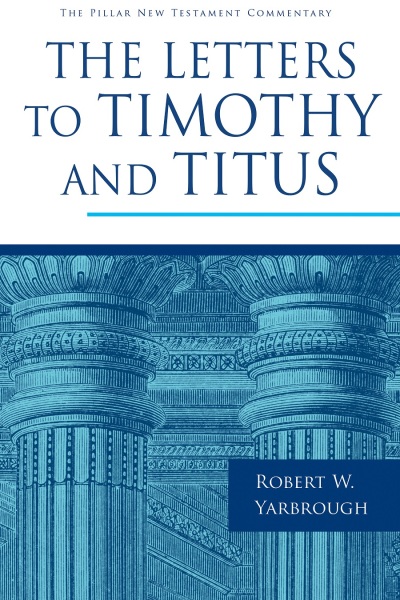
Pillar New Testament Commentary (PNTC): The Letters to Timothy and Titus (Yarbrough)
The Pastoral Letters—1 Timothy, 2 Timothy, and Titus—have made an enduring contribution to understanding the role of pastors in the church. With a spirited devotion to the text, Robert Yarbrough helps unlock the meaning of these short but rich letters in this commentary.
In keeping with the character of Pillar New Testament Commentary volumes, The Letters to Timothy and Titus offers a straightforward reading of these texts. Their primary concerns—God, salvation, and the pastoral task—remain central to Yarbrough’s thorough and comprehensive exegesis. Engaging with the best scholarship and resources, Yarbrough shows how these letters are as relevant today as they were to the early Christians.
The Pillar New Testament Commentary, designed for serious readers of the Bible, seeks above all to make clear the meaning of the text of Scripture as we have it. Writers of the PNTC volumes interact with the most important, informed contemporary debate yet avoid undue technical detail. Their ideal is a blend of rigorous exegesis and exposition, scholarship and pastoral sensitivity, with an eye alert both to biblical theology and to the contemporary relevance of the Bible.
While Today's New International Version is generally the translation of choice for the English text, Pillar authors base their exposition on the Greek New Testament. They are deeply committed to a fresh wrestling with the biblical text, using every means at their disposal to "loosen the Bible from its pages" to help readers understand what the text says and how to apply it to life today.
Reviews
"Yarbrough's commentary matches the goal of the Pillar series. He writes with clear theological interest and directs his comments to practical, pastoral issues — as the Pastoral Letters themselves do. Those who have followed this series undoubtedly will find this work a useful addition." — Mark A. Seifrid, Concordia Seminary.Robert W. Yarbrough is professor of New Testament at Covenant Theological Seminary in St. Louis, coeditor of the Baker Exegetical New Testament Commentary series, and coauthor of the widely used textbook Encountering the New Testament.
Pillar New Testament Commentary (PNTC): The Second Letter to the Corinthians
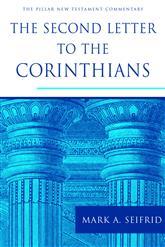
Pillar New Testament Commentary (PNTC): The Second Letter to the Corinthians
The question that Paul set before the ancient church in Corinth -- Do you not recognize that Jesus Christ is in and among you? (2 Cor 13:5) -- remains a critical question for the church today. This commentary by Mark Seifrid seeks to hear Paul’s message afresh and communicate it to our time.
Seifrid offers a unified reading of 2 Corinthians, which has often been regarded as a composite of excerpts and fragments. He argues that Paul’s message is directed at the “practical atheism” of the Corinthian church -- the hidden heresy that assumes God’s saving work in the world may be measured by outward standards of success and achievement.
Like all of the Pillar volumes, Seifrid’s commentary on 2 Corinthians offers careful grammatical analysis and exegesis with clear pastoral application.
Preaching the Word - 1 & 2 Thessalonians
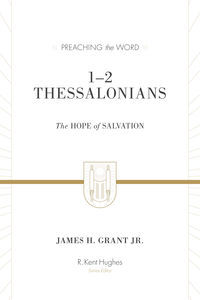
Preaching the Word - 1 & 2 Thessalonians
Paul wrote to the church in Thessalonica to encourage them to live in the light of the gospel. In his two letters he addresses a number of topics, including the persecution they were enduring, the second coming of Christ, and how they were to live in the present times. While the letters were written nearly two thousand years ago, pastor James H. Grant Jr. insists that Paul’s audience includes us as well as the Thessalonians.
Grant applies Paul’s message to contemporary churches by moving expositionally through 1 & 2 Thessalonians. Twenty-five sermons examine each passage of the books as the gospel and its implications are unpacked in light of Christ’s second coming.
1 & 2 Thessalonians is a Preaching the Word commentary. The series is noted for its unqualified commitment to biblical authority, clear exposition of Scripture, readability, and practical application. It is an ideal resource for pastors and teachers, as well as for personal Bible study.
Preaching the Word - 1 Corinthians

Preaching the Word - 1 Corinthians
The issues addressed in the the book of 1 Corinthians are strikingly similar to the issues faced by the Church today: sin, pride, disunity, and confused identities. Paul warns the Corinthians with words of exhortation, but not without profound encouragement. In doing so, he points modern readers to the hope offered to Christians as they follow Jesus in a fallen world.
In this commentary, pastor Stephen Um uses powerful illustrations and practical applications to point readers and teachers of the Bible to the heart of Paul’s first letter to the Corinthians: the gospel of Jesus Christ that has the power to save, change, and unite God’s people.
Preaching the Word - 1 Samuel
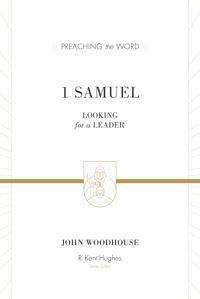
Preaching the Word - 1 Samuel
What kind of leaders should we follow? What kind of leaders should we be? And what does God have to do with it? These are some of the questions inherent in 1 Samuel, with its portrait of divine response to ancient Israel's leadership crisis. That crisis was met through three men-Samuel, Saul, and David-in ways that forever changed the character of Israel's leadership and clarified what God requires of his people and their leaders.
As John Woodhouse demonstrates, 1 Samuel's biblical context provides serious reflection on our need for leadership and the failure of human leaders. But it also reveals God's answer for Israel, which turns out to be his answer for the whole world and for each of us individually. This perceptive commentary not only illumines Old Testament history but brilliantly points to the New Testament promise that was fulfilled in Jesus, our sovereign leader and Savior. Part of the Preaching the Word series.
Preaching the Word - 1&2 Peter and Jude

Preaching the Word - 1&2 Peter and Jude
Neither Peter nor Jude minced words about the realities that would confront every Christian and that were confronting the church at large-suffering and persecution, contradictory views of the gospel, constant challenges to the faith at the hands of false teachers. Yet even in the face of these harsh realities, both biblical writers unswervingly declared that there is no cause for despair as long as one's foundation and identity are in Christ.
With the truths of 1-2 Peter and Jude echoing across the ages, commentator David Helm beckons us to listen in his stirring exposition. Yet it is not enough to listen, he says. Peter's and Jude's words must compel us to do just what the early Christians did: hold fast to their identity in Christ, ground themselves in the truth, live lives worthy of their calling, and vigorously contend for the faith. Part of the Preaching the Word series.
Preaching the Word - 1-2 Timothy and Titus
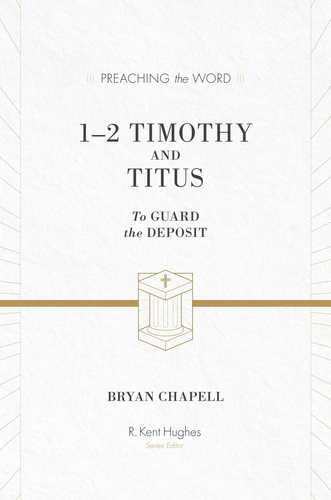
Preaching the Word - 1-2 Timothy and Titus
There are substantial reasons to be energized about studying the Pastoral Letters of Paul. Between them they teach the proper ordering of the church (1 Timothy), they present a developed challenge to all Christians (2 Timothy), and they suggest God’s priorities for mature ministry (Titus). Experienced pastors R. Kent Hughes and Bryan Chapell have done their homework—applying sound principles in interpreting the texts so that we can understand what Paul was really saying.
Teaching on important matters for the local church, Hughes and Chapell offer a timely word to the many Christians who are concerned about their role and responsibility to communicate the truth of the gospel in this diverse and pluralistic society. The Pastoral Letters remind us that, like Timothy, we are to guard what has been entrusted to our care, to fight the good fight, and to keep preaching the Word.
Through the apostle's words and the commentators' insights here, we gain an understanding of what God requires of those who would lead in the local church, as well as of those who would be led. Embracing grace, loving godliness, and sharing Christ were not just charges to the early believers, and are not solely the responsibility of pastors, deacons, and elders in the church. They are exhortations for any of us who call ourselves disciples of Christ today.
Preaching the Word - 1-3 John
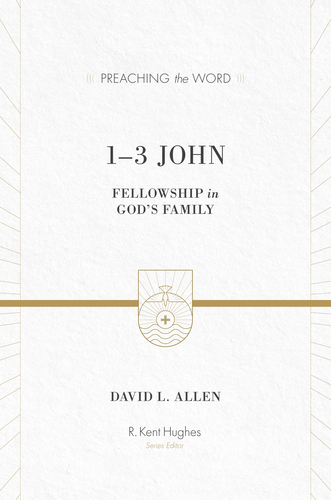
Preaching the Word - 1-3 John
This commentary on 1–3 John is a great resource for pastors and laypersons alike, showing how John’s letters lay out the foundational nature of truth and love in the context of the local church, with teachings that overflow with theological depth and real-world wisdom. Part of the Preaching the Word commentary series.
Preaching the Word - 2 Corinthians

Preaching the Word - 2 Corinthians
During Paul’s ministry, Corinth was a newly rebuilt, bustling, important city in the Roman Empire. It was a place full of pride, individualism, wealth, and religious pluralism. No wonder its inhabitants held little regard for Paul’s message!
Sound familiar? Our contemporary culture has much in common with ancient Corinth. The relevance of this book to churches today is astounding. Paul delivers powerful theology that turns the values of the ancient Roman world upside-down—the grace of God, the centrality of the cross, and God’s power made perfect in weakness. He challenges us to live counterculturally.
In this commentary on 2 Corinthians, Pastor R. Kent Hughes carefully examines this second letter from the apostle Paul to the church in Corinth, continuing to provide rich biblical insight for the body of Christ.
Preaching the Word - 2 Samuel

Preaching the Word - 2 Samuel
King David stands as one of the most important figures of world history. From children’s storybooks to Michelangelo’s famous statue, ancient Israel’s most famous king is still remembered and recognized by people around the world three thousand years after he lived.
In this commentary on the book of 2 Samuel, professor and former pastor John Woodhouse helps readers deepen their understanding of David’s tumultuous reign by highlighting his place in salvation history—a history that began with Israel but now encompasses God’s plan for the whole world. What’s more, he shows that the concept of the kingdom of God is crucial to the whole storyline of the Bible . . . and for our lives today.
Designed as a trustworthy resource for pastors who preach and teach on a regular basis, this commentary makes the case that David’s story is relevant because it lays the crucial foundation for the life and ministry of Jesus Christ, “the Son of David.”

Dynamic churches–congregations that are experiencing phenomenal growth, Christian ministries that God is using to take down walls, churches where souls are being saved and lives transformed–inspire us and make for great reading. The book of Acts, the divinely inspired history of the early church, is all this and more.
In the author's words: "One reason I love to study the book of Acts is its uniqueness. It is the sourcebook for the spread of early Christianity. Without it we would know little about the apostolic church except what could be gleaned from Paul's epistles. It is the chronicle of the spreading flame of the Holy Spirit."
In this welcome addition to the Preaching the Word series, Pastor Kent Hughes explores the key narratives of the book of acts, including the birth of the church, bold gospel preaching resulting in the prospering of the church, and the dramatic missionary journeys of the Apostle Paul.
Preaching the Word - Colossians and Philemon
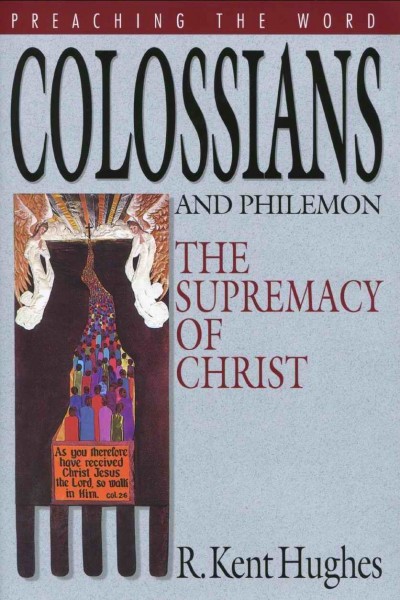
Preaching the Word - Colossians and Philemon
In our day of massive religious confusion, the message of Colossians is among the most timely of all the New Testament books. Today many seek to exclude belief in God from every corner of modern life. Others flaunt "New Age" ideas about God and Christ which collide with the Scriptures. Confusion reigns and many are in need of knowing the Truth.
Christians in the first-century city of Colosse lived in a similar situation. Having first received the true Christian faith, they were soon confronted with distortions of the truth concerning the divinity and humanity of Christ and at the same time tempted by spiritual elitism. And the answers they needed are the same timeless answers that the modern world cries out to hear.
In this study of Colossians; Pastor R. Kent Hughes' expositions go to the heart of the text in Colossians, amplifying its message with memorable illustrations and penetrating insight. His careful exegesis and perceptive applications offer new understanding and promote lasting growth in Christ.
Here is a resource with solid help for pastors, teachers, and indeed anyone who wishes to understand or to communicate the grand message of the book of Colossians—a timely volume with enduring value of the Church of Jesus Christ.
Preaching the Word - Daniel
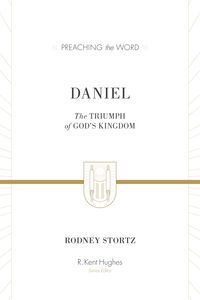
Preaching the Word - Daniel
Containing both triumphant stories of God's provision and difficult prophetic images, the book of Daniel stirs readers' imagination and interest. Examples abound of Daniel's unswerving dedication to the God of Israel, and the prophet describes the coming days in striking detail.
Throughout this book the nature of Daniel's God is revealed to us. God's plans for the future judgment and deliverance of this world, and his followers' relationship with him throughout these events, mark the book. He is a God who loves his people and is in sovereign control over all the events of this world. His knowledge and control over both present circumstances and future events is undeniable.
In this study of Daniel, Pastor Rodney Stortz showcases the coming triumph of God's kingdom. Stortz's careful exegesis and perceptive applications focus on personal holiness, the wisdom and power of God, and the importance of Daniel's prophecies concerning the Messiah, the Antichrist, and Antiochus Epiphanes. In addition, this commentary uses the light of the New Testament to unseal Daniel's scroll, giving a clear understanding of his prophecies. This expositional commentary shows plainly how central the book of Daniel is for understanding coming judgment and the necessity for faithful living until then.
Preaching the Word - Deuteronomy
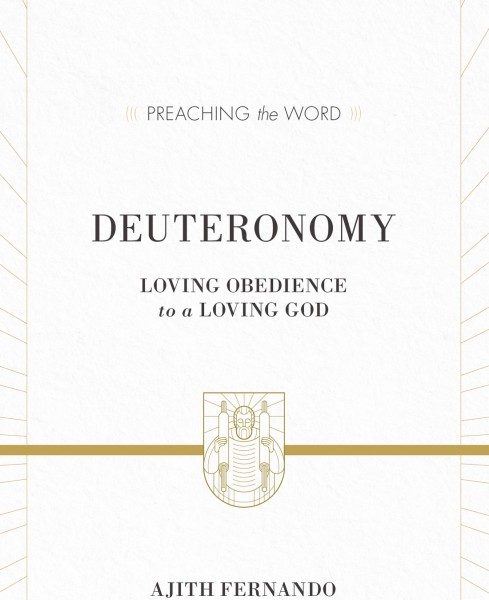
Preaching the Word - Deuteronomy
The book of Deuteronomy is a call to obedience—the proper response to God’s faithfulness and love. Consisting primarily of speeches that Moses gave to the Israelites shortly before they entered the Promised Land, Moses’ words proclaimed God’s covenant faithfulness in hopes of motivating the Israelites to obey God despite the coming temptation to conform to the Canaanite culture.
The challenges they faced then are remarkably parallel to those facing Christians today as we grapple with the issue of obedience in a world that offers other attractive ways of life. We wonder: How can we be faithful to God? And how do we help our children and the people we lead to be faithful? This book tells us how Moses tackled these challenges and, as Paul confirms in the New Testament, Deuteronomy serves “as an example…written down for our instruction” (1 Cor. 10:11).
Ajith Fernando unpacks the relevance of Deuteronomy and captivates us with rich anecdotes from his thirty-five years of ministry to first-generation Christians in Sri Lanka. He offers concrete examples of how the truths contained in Deuteronomy can be applied, and he teaches us that obedience is the necessary response to the God who loves and saves us.
Preaching the Word - Ecclesiastes
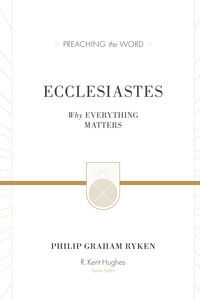
Preaching the Word - Ecclesiastes
The book of Ecclesiastes is "about life, the way it really is," writes commentator Philip Ryken. Readers throughout the ages have been drawn to the way it honestly wrestles with the tedium of work, injustices in this life, the ravages of age, and the inevitability of death. But its wisdom, according to Ryken, is in teaching people to trust God with life's questions even in the midst of struggles.
Pastors, writers, speakers, and students will find this Preaching the Word commentary to be a helpful resource in their teaching and studies. Ryken explores what will happen if we choose the world's offerings instead of God's and teaches valuable lessons about what it means to have a God-centered worldview.
Ecclesiastes is the twenty-sixth volume of the Preaching the Word series—noted for its clear exposition, readability, practical application, and unqualified commitment to biblical authority. Ryken's commentary will not only enrich any individual study of Ecclesiastes but will equip Christian leaders in communicating its universal application to a wide audience.
Preaching the Word - Ephesians
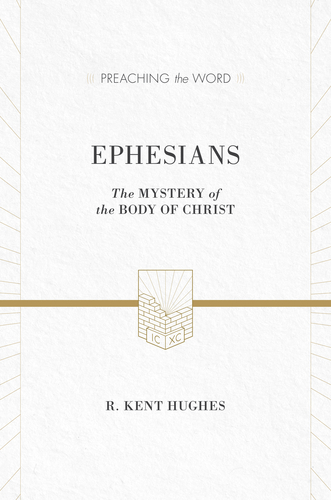
Preaching the Word - Ephesians
The Apostle Paul’s Letter to the Ephesians is one of the most dynamic portions of all of Scripture. Called by one commentator “the crown and climax of Pauline theology,” it issues a clarion call to all who follow the Master. With its dual focus on Christ and the Church, as well as its careful presentation of doctrine and duty, Ephesians points the way to true Christian living and victory in a sin-embattled world.
In this helpful volume, Pastor Hughes provides an engaging treatment of the major themes of Ephesians:
- The celebration of full redemption
- The mystery of a new humanity—a third race—in Christ
- The fullness of the Spirit for holy living
- The beauty of God-given roles in the home and workplace
- The implications of our position with Christ in the heavenly realms
- Resounding victory in spiritual warfare
This practical commentary on one of the most important expositions of Pauline soteriology in the New Testament will challenge and equip both pastors and students for a walk of spiritual power.
Preaching the Word - Exodus

Preaching the Word - Exodus
To read Exodus is to encounter God. The book is about the mercy, justice, holiness, and glory of almighty God, who rules history by his sovereign power, saves the people of his covenant, and delivers his people from bondage. Once heard, the stories recorded in Exodus leave a lasting impression. Readers return to these great acts of redemption again and again because they give every captive the hope of freedom.
In this Preaching the Word volume, Philip Graham Ryken mines the majestic book of Exodus for knowledge of God's character and instruction for his followers. So much can be learned about God through the accounts of his deliverance of the Israelites from Egypt, his many divine interventions for them, and his transformation of them into an independent nation.
At once theologically instructive and decidedly practical, this commentary moves readers to great rejoicing at God's work in the life of every person following him on the path to spiritual freedom. Ryken skillfully relates how the Israelites' deliverance from slavery anticipated the salvation accomplished in Jesus Christ, proving that God remembers his covenant and always delivers on his promises. For those who preach, teach, and study God's Word, this book is more than just a commentary; it is a celebration of God's faithfulness.
Preaching the Word - Ezra, Nehemiah and Esther
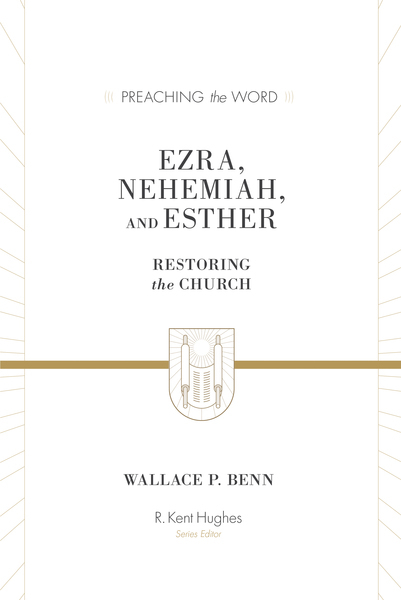
Preaching the Word - Ezra, Nehemiah and Esther
A Verse-by-Verse Commentary on the Books of Ezra, Nehemiah, and Esther
Packed with exciting Biblical history, the books of Ezra, Nehemiah, and Esther display God’s faithfulness through trials, the promise of restoration, and the beauty of revival.
This commentary provides deep insights to help pastors and teachers draw connections between Ezra and Nehemiah, both of whom display godly leadership and the power of prayer. Then readers will follow Esther to learn how God’s providence reigns, even in a pagan world, and see how each of these Old Testament books points to the promise of our Savior Jesus Christ.
Pastor and experienced Bible expositor Wallace P. Benn expertly discusses Ezra, Nehemiah, and Esther verse by verse, and provides insightful observations, illustrations, and applications.
Endorsements
“This series resonates with the priorities of the pulpit. No academic aloofness here, but down-to-earth, preacher-to-preacher meat for God’s people.” - Bryan Chapell, Stated Clerk, Presbyterian Church in America
“The single best resource for faithful biblical exposition available today. A great boon for genuine reformation!” - Timothy George, Distinguished Professor of Divinity, Beeson Divinity School, Samford University; General Editor, Reformation Commentary on Scripture
“There is a long history of informed, edifying biblical expositions that have been mightily used for God to shape and strengthen the church. These volumes admirably fit this tradition.” - D. A. Carson, Theologian-at-Large, The Gospel Coalition
“Throughout the Christian centuries, working pastors have been proving themselves to be the best of all Bible expositors. Kent Hughes stands in this great tradition, and his exciting expositions uphold it worthily.” - J. I. Packer, Late Board of Governors’ Professor of Theology, Regent College
“The Preaching the Word series is a fine set of commentaries for any pastor. It has a great balance between intellect and heart, covering both interpretation and application. You can’t go wrong with this set. It will improve your preaching.” - Rick Warren, Pastor, Saddleback Church, Lake Forest, California
“It is a pleasure to commend this series of homiletical commentaries. They fill an enormous vacuum that exists between the practical needs of the pastor/teacher and the critical exegetical depth of most commentaries.” - Walter C. Kaiser Jr., President Emeritus and Colman M. Mockler Distinguished Professor Emeritus of Old Testament, Gordon-Conwell Theological Seminary
Wallace P. Benn is a well-known Bible teacher and preacher in the British Isles and Ireland. He is the founder of Bible by the Beach, a Bible-teaching convention in Eastbourne, England, and a trustee of Irish Church Missions, an evangelical church-planting agency in Ireland. Wallace and his wife, Lindsay, have two grown children and three grandchildren. They are members of St. Botolph’s Church in Kettering, England.
Preaching the Word - Galatians

Preaching the Word - Galatians
Paul’s letter to the Galatians stands as a key book in the Bible, especially as it relates to the Old Testament Law and to the Christian’s “freedom in Christ.” Paul’s emphasis on Jesus’s substitutionary death, justification by faith, and the work of the Spirit makes the letter crucial for a complete understanding of the New Testament’s teaching on salvation through faith in Christ. Combining scholarly depth with practical wisdom, pastor Todd Wilson has written a commentary based on years of ministry experience and biblical reflection, resulting in a resource that is exegetically engaged, theologically informed, and pastorally relevant. Paul’s passionate exhortation for the Galatians to return and cling to the gospel that saved them remains relevant today, reminding modern readers of the importance of God’s grace for all of life.
Preaching the Word - Genesis
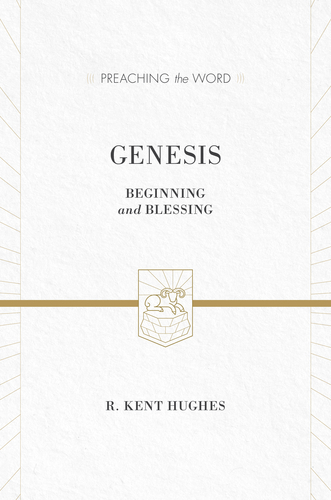
Preaching the Word - Genesis
The book of Genesis contains some of the most beautiful and well-known stories in the Bible: the garden, the flood, the tower of Babel, and the lives of the patriarchs. But these are more than just good stories. They lay the groundwork for God’s relationship with humanity and for his plan for our salvation, making Genesis foundational to understanding everything else that happens in the Bible. Genesis reveals much about human nature and the nature of God. From the actions of the first man and woman, we see where our rebellious, sinful nature originates. And through the whole book we see the hand of a sovereign God who is loving and merciful, but also just and holy. Time and again in Genesis, God showers his grace upon undeserving humanity, giving us our first tastes of God’s enduring faithfulness that shines throughout the entire Bible. R. Kent Hughes, respected pastor and author of many other commentaries in this series, takes readers back to the beginning of the Bible and moves through Genesis with careful exegesis. He explores the superbly crafted structure of the book as well as the weighty themes it contains. For those who preach, teach, and study God’s Word, this exceptionally detailed work will reveal much about the beginnings of God’s great story.
Preaching the Word - Hebrews Volume 1

Preaching the Word - Hebrews Volume 1
The book of Hebrews conveys a double dose of spiritual power. It not only presents the greatness of Christ in ways no other New Testament writing does, but it repeatedly demands a heart response from the reader. No one can study Hebrews and not grow spiritually and come face to face in a new way with Christ.
It is also true that no New Testament book has had more background research than Hebrews, and none has spawned a greater diversity of opinion. However, virtually all agree that the grand theme of this epistle is the supremacy and finality of the Lord Jesus Christ.
Life-changing themes come from God to us in this marvelous epistle. The unequalled glories of Jesus Christ—the solemn danger of drifting away from dependence on divine grace—a heavenly high priest who understands and is ever ready to help—the rest only God can give, even in the middle of trials and of demanding ministry—the hope that is ours through a blood covenant with an awesome God—these and other topics from Hebrews must be understood and put to work practically if we are to live and serve as God's people today.
Those who preach, teach, and study the Word of God will find this book a gold mine of helpful discussion a Bible book easily misunderstood and often overlooked. With divisions and outlines that are never forced but flow naturally from the text, Hebrews will be a great resource for all who desire to communicate God's truth and seek to grow in their own faith through personal Bible study.
Preaching the Word - Hebrews Volume 2
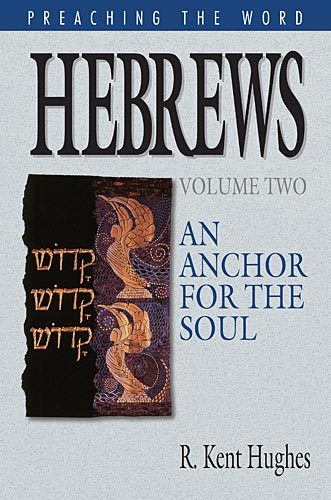
Preaching the Word - Hebrews Volume 2
The book of Hebrews conveys a double dose of spiritual power. It not only presents the greatness of Christ in ways no other New Testament writing does, but it repeatedly demands a heart response from the reader. No one can study Hebrews and not grow spiritually and come face to face in a new way with Christ.
It is also true that no New Testament book has had more background research than Hebrews, and none has spawned a greater diversity of opinion. However, virtually all agree that the grand theme of this epistle is the supremacy and finality of the Lord Jesus Christ.
Life-changing themes come from God to us in this marvelous epistle. In this follow-up volume, respected pastor and author R. Kent Hughes continues his study of a marvelous Scriptural document. The delights and challenges of personal relationship with Jesus Christ—the perils of apostasy—perseverance in one's walk with God—the true meaning of trust and surrender as seen in God's "Hall of Faith"—the benefits of divine discipline—right and wrong in personal and church life—these and other lofty themes lead to increased commitment to Christ and holier living.
Those who preach, teach, and study the Word of God will find this book a gold mine of helpful discussion on a Bible book easily misunderstood and often overlooked. A practical commentary on an important Bible book, it will help preachers, teachers, and all students of the Word of God experience new levels of spiritual power and effectiveness in ministry.
Preaching the Word - Isaiah
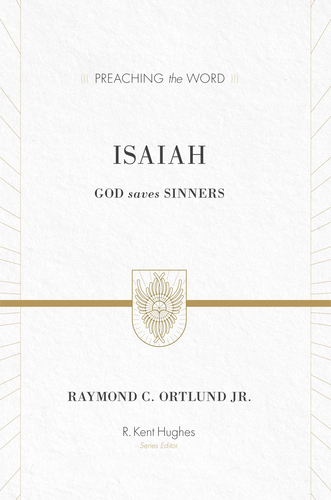
Preaching the Word - Isaiah
Isaiah is widely considered the deepest, richest, and most theologically significant book in the Old Testament. It is, without question, a profound statement by God about his own sovereignty and majesty spoken through his chosen spokesman, the prophet Isaiah.
In this accessible commentary on the book of Isaiah, Raymond C. Ortlund Jr. argues that Isaiah imparts a single vision of God throughout all sixty-six chapters. It is a unified, woven whole that ultimately shows that God saves sinners. He saves them from their own self-invented salvations, so that they can walk in the light of his love.
Ultimately, the message of Isaiah offers us a God-centered confidence that enables us to face anything while challenging us to trust God in new ways.
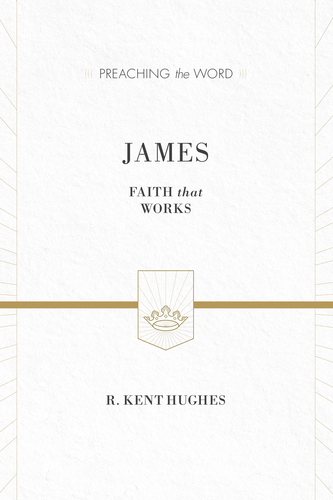
One of the most practical books in the New Testament, the book of James is a call to action. This epistle focuses on the outworking of the Christian life, pointing us to the necessary relationship between faith and works. In a world of trials, temptation, conflict, and conceit, James urges us to demonstrate our faith through the way we live.
Pastor Kent Hughes walks readers through what James has to teach us about persevering through suffering, taming the tongue, recognizing true wisdom, and living out the Word of God. With relevant discussions and practical applications, this commentary will help anyone teaching or studying the letter of James understand a crucial truth about genuine faith: it always produces good works.
R. Kent Hughes (DMin, Trinity Evangelical Divinity School) is senior pastor emeritus of College Church in Wheaton, Illinois, and professor of practical theology at Westminster Theological Seminary in Philadelphia, Pennsylvania. Hughes is also a founder of the Charles Simeon Trust, which conducts expository preaching conferences throughout North America and worldwide. He serves as the series editor for the Preaching the Word commentary series and is the author or coauthor of many books. He and his wife, Barbara, live in Wyncote, Pennsylvania, and have four children and an ever-increasing number of grandchildren.






- Adapt your commentary collection month-to-month based on the book or books you are studying.
- Build your commentary library strategically without hundreds of dollars of upfront investment.
- Never get stuck with commentaries you rarely use - swap them out each month as your needs change.



